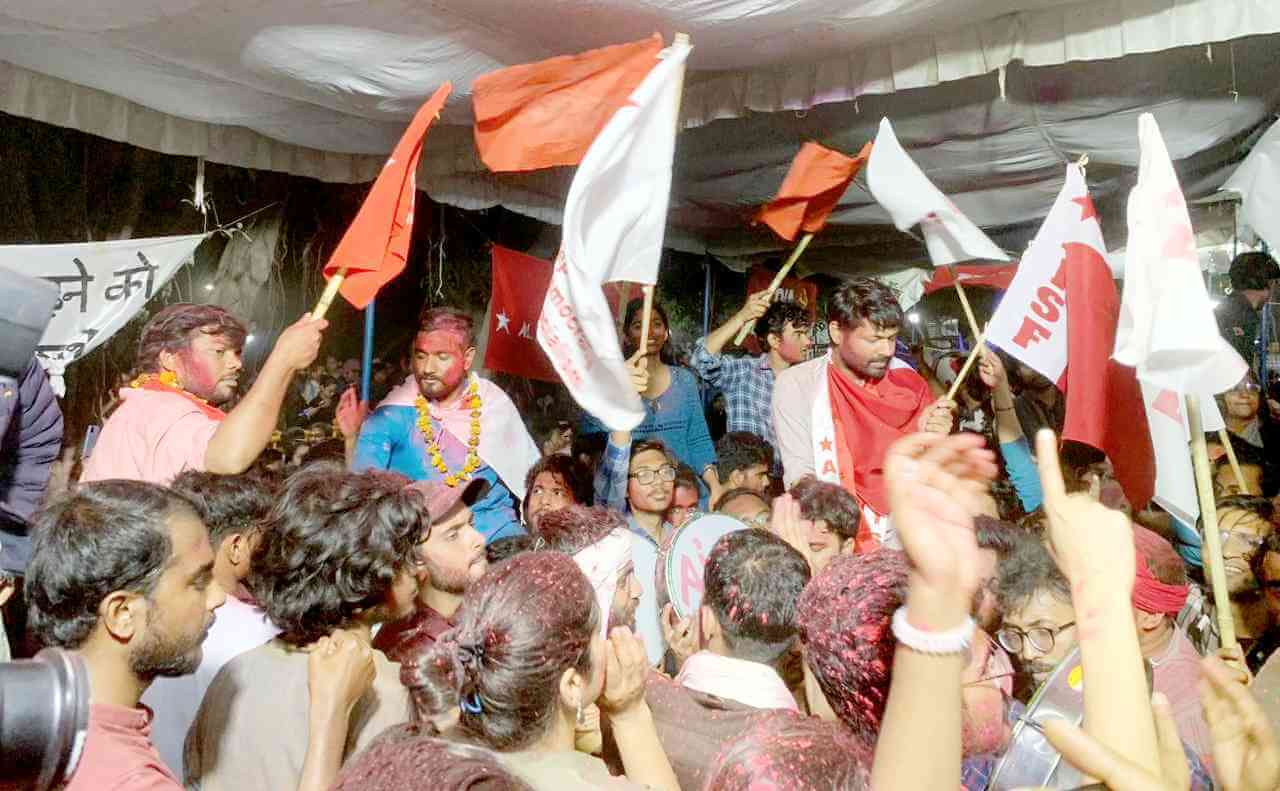Red Wave in JNU Students Elections, Students Cast Decisive Mandate

Dhananjay of AISA elected JNUSU President
The United Left Panel has emerged victorious in the JNUSU Elections held after a gap of four years on March 22. The results are a decisive mandate against the right-wing ABVP and the politics of communalism and hatred.
The President, Dhananjay of AISA, won with a total of 2,598 votes in his favour, and a lead of 922 votes. Avijit Ghosh of SFI won the post of vice president securing 2409 votes and for the post Joint Secretary, Md Sajid of AISF won with 2574. Meanwhile, Priyanshi Arya of BAPSA was elected as General Secretary securing 2887 votes. After the last-minute cancellation of candidature of left panel candidate Swati Singh of DSF for the post of Joint Secretary, the United Left issued the call to support Priyanshi to ensure 'Not an Inch to ABVP'.
At a time when the BJP government along with the ABVP had been constantly attempting to destroy JNU’s democratic ethos and idea of inclusive education, the result of JNUSU elections have reverberated across the country. The election witnessed highest voter turnout of 73% with 5,656 students participating in the voting process.
CPIML's Anti-Caste Struggle Inspired Me: Dhananjay
Dhananjay joined AISA in 2014 when the struggle against Four-Year Undergraduate Programme (FYUP) was undertaken in University of Delhi. At present, he is pursuing a PhD from the School of Arts and Aesthetics.
After Batti Lal Bhairwa, who was the JNUSU President in 1996, Dhananjay becomes the second President belonging to the Dalit community in the history of JNUSU. The youngest of the six siblings, Dhananjay is from Gaya (Bihar) which is known to be a deeply entrenched feudal society. His father is a retired policeman. Since he was from rural Bihar and studied in Jharkhand, he was inspired by the class and anti-caste struggles led by CPIML, and this formidably helped him join AISA in his days at DU.
He has been part of multiple struggles led by AISA, starting from FYUP and ‘red bus’ pass, to ‘Re-Open JNU’ protest, ‘Unlock JNU’ movement, and all other student-led struggles. During the lockdown, he and other AISA activists stood with the JNU workers’ struggle for their rights. From raising his voice for the safe working conditions of sanitation workers and against retrenchment of workers of contractual under the garb of a lockdown, he took part in AISA’s initiative of covid helpdesk to reach out to the migrant workers, slum residents and other informal workers with necessary relief materials, such as ration, safety gear, oxygen cylinder and medicines.
Dhananjay is also a cultural activist who was part of ‘Sangwari’, a Delhi-based cultural troupe, which performed across the country. He is a street theatre artist who performed for the protesting DTC workers, in solidarity with the Pricol workers of Tamil Nadu, and in the working-class areas across Delhi.
Student’s Reply to Modi Regime’s Attack on Education and Democracy
Dhananjay said in his speech during the Presidential Debate, this was a referendum on the Modi Government and the election was being fought for the farmers fighting against the anti-farm laws, the workers who are fighting for their rights, the Dalits who are fighting for dignity, the students fighting for affordable and equal education, and the youth fighting for dignified employment! He said, “I stand here as a voice of the Dalit landless workers of southern Bihar who bravely fought for their land-economic rights and social dignity, who faced massacres by the feudal-upper caste army, Ranveer Sena, and, yet, bravely continued their fight against feudal dominance. I stand here as a voice for Comrade Manoj Manzil, a popular Dalit youth leader of CPIML, who has been imprisoned by the feudal-fascist government in Bihar. I stand here to tell today's fascist regime that your jails will not be enough to suppress our voices. We will speak and fight for justice."
Dhananjay, in this victory address said that, “Despite all attempts by the RSS-ABVP to clamp down and corrode on the democratic space of JNU and the continued incarceration of JNU students like Sharjeel Imam, Umar Khalid, Anirban Bhattacharya and others branding them as ‘Anti-nationals’, JNU has stood tall amongst all adversities. Even after defeat, ABVP is attempting to portray JNU community as ‘anti-national’ and spread communal polarisation through screening of movies like 'Bastar: The Naxal Story' and 'JNU: Jahangir National University.' But such regressive forces will fail in their conspiracy. This JNUSU and the students of campus will defeat such divisive and anti-student forces. The JNUSU will nurture debate, critical thinking and democracy on campus!

Charu Bhawan, U-90, Shakarpur, Delhi 110092
Phone: +91-11-42785864 | +91 9717274961 E-mail: info@cpiml.org

